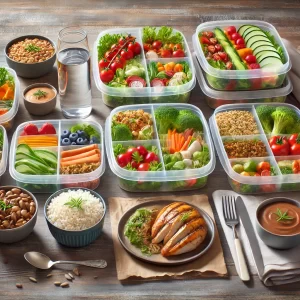The High-Protein Diet for Weight Loss: A Beginner’s Guide to Muscle Gain and Fat Loss
Introduction to the High-Protein Diet
The High-Protein Diet is a popular approach to weight loss and muscle building that focuses on increasing your intake of protein-rich foods while reducing carbohydrates and fats. Protein is an essential macronutrient that plays a critical role in muscle repair, fat loss, and overall body composition. By following a High-Protein Diet,  you can enhance your metabolism, preserve muscle mass, and reduce hunger, making it easier to create a calorie deficit and lose weight.
you can enhance your metabolism, preserve muscle mass, and reduce hunger, making it easier to create a calorie deficit and lose weight.
Protein has a higher thermic effect than carbohydrates and fats, meaning that your body burns more calories digesting and metabolizing protein. This makes the High-Protein Diet especially effective for those looking to lose fat and build lean muscle. In this guide, we’ll explore how the High-Protein Diet works, its benefits for weight loss and muscle gain, and tips for incorporating high-protein foods into your meals.
How the High-Protein Diet Works for Weight Loss
The High-Protein Diet works by increasing your protein intake to support muscle maintenance, enhance fat loss, and reduce hunger. Protein helps stabilize blood sugar levels, promotes feelings of fullness, and supports muscle recovery after exercise. By focusing on protein-rich foods, you can maintain a healthy metabolism while losing fat.
Increases Satiety and Reduces Hunger
Protein is more filling than carbohydrates and fats, which means that it can help reduce hunger and keep you feeling satisfied for longer. This makes it easier to control your calorie intake and avoid overeating, which is crucial for weight loss.
Supports Muscle Maintenance and Fat Loss
When you reduce calories to lose weight, your body can break down muscle tissue for energy. The High-Protein Diet helps prevent muscle loss by providing the necessary protein for muscle repair and growth. By preserving muscle mass, you can maintain a higher metabolic rate, which supports long-term fat loss.
Boosts Metabolism
Protein has a higher thermic effect than carbohydrates and fats, which means that your body burns more calories digesting and metabolizing protein. This increase in calorie expenditure can help boost your metabolism and promote fat loss.
Key Components of the High-Protein Diet
The High-Protein Diet emphasizes protein-rich foods while moderating your intake of carbohydrates and fats. Here are the key components of the diet:
- Lean Proteins: Foods like chicken, turkey, fish, eggs, tofu, and legumes are excellent sources of lean protein that support muscle maintenance and fat loss.
- Low-Carb Vegetables: Non-starchy vegetables like spinach, broccoli, cauliflower, and bell peppers provide fiber and essential vitamins while keeping carbs low.
- Healthy Fats: Incorporate healthy fats like avocado, olive oil, and nuts in moderation to support overall health and enhance satiety.
- Complex Carbohydrates (Optional): If you include carbs in your diet, focus
 on complex carbohydrates like quinoa, oats, and brown rice, which provide sustained energy without spiking blood sugar levels.
on complex carbohydrates like quinoa, oats, and brown rice, which provide sustained energy without spiking blood sugar levels.
Benefits of the High-Protein Diet for Weight Loss and Health
The High-Protein Diet offers numerous benefits for weight loss, muscle gain, and overall health. Here’s how it can positively impact your body:
1. Promotes Muscle Gain and Preservation
Protein is essential for muscle growth and repair, making it a critical component of any weight loss or muscle-building plan. By consuming enough protein, you can maintain muscle mass while losing fat, leading to a leaner, more toned physique.
2. Increases Calorie Burning
As mentioned earlier, protein has a higher thermic effect than other macronutrients, which means that your body burns more calories processing protein. This increase in calorie expenditure can help boost your metabolism and support fat loss.
3. Reduces Hunger and Cravings
High-protein meals are more filling and satisfying, which can help reduce hunger and prevent overeating. By reducing cravings for unhealthy snacks, you can stick to your weight loss plan more easily.
4. Supports Fat Loss While Preserving Lean Mass
When you lose weight, it’s important to preserve lean muscle mass while shedding fat. The High-Protein Diet helps prevent muscle loss by providing the necessary amino acids for muscle repair, ensuring that you lose fat instead of muscle.
5. Improves Body Composition
By promoting muscle growth and fat loss, the High-Protein Diet can improve your body composition, leading to a leaner, more toned appearance. This makes it an ideal choice for those looking to improve their physique while losing weight.
Potential Drawbacks of the High-Protein Diet
While the High-Protein Diet offers many benefits, there are a few potential challenges to consider:
1. May Be Hard to Sustain Long-Term
Some people may find it difficult to maintain  a high-protein diet over the long term, especially if they’re used to eating a higher-carb or lower-protein diet. It’s important to find a balance that works for you and allows you to stick to the diet consistently.
a high-protein diet over the long term, especially if they’re used to eating a higher-carb or lower-protein diet. It’s important to find a balance that works for you and allows you to stick to the diet consistently.
2. Can Be Expensive
Protein-rich foods like lean meats, fish, and high-quality protein supplements can be more expensive than other food groups. It’s important to plan your meals carefully and choose affordable protein sources like eggs, legumes, and tofu.
3. Requires Careful Meal Planning
The High-Protein Diet requires careful meal planning to ensure that you’re getting enough protein while still maintaining a balanced intake of fats and carbohydrates. It’s important to plan your meals in advance to avoid relying on unhealthy, high-fat, or high-carb options.
Tips for Success on the High-Protein Diet
To get the most out of the High-Protein Diet and achieve your weight loss and muscle gain goals, follow these practical tips:
1. Prioritize Lean Protein in Every Meal
Make sure to include a source of lean protein, such as chicken, fish, eggs, or tofu, in every meal to support muscle maintenance and fat loss. Aim for 20-30 grams of protein per meal to keep your body fueled and satisfied.
2. Pair Protein with Vegetables
Non-starchy vegetables like spinach, broccoli, and cauliflower provide fiber, vitamins, and minerals without adding many calories or carbs. Pair your protein with a generous portion of vegetables to create balanced, nutrient-dense meals.
3. Stay Hydrated
Drinking plenty of water is essential for digestion, metabolism, and overall health. Make sure to drink at least 8 glasses of water a day to support your body’s protein metabolism and promote fat loss.
4. Choose High-Quality Protein Sources
Focus on high-quality protein sources, such as lean meats, fish, eggs, and plant-based proteins, to ensure that you’re getting the best nutrients for your body. Avoid processed meats and protein sources that are high in unhealthy fats or additives.
5. Include Healthy Fats
While the High-Protein Diet emphasizes protein, it’s important not to neglect healthy fats. Include sources of healthy fats like avocado, nuts, and olive oil in your meals to support overall health and improve satiety.
Scientific Evidence and Case Studies
Research has shown that high-protein diets are effective for weight loss, muscle gain, and fat loss. A study published in The American Journal of Clinical Nutrition found that participants who followed a high-protein diet lost more fat and preserved more muscle compared to those who followed a lower-protein diet. Additionally, a study in Obesity found that high-protein diets increased satiety and reduced overall calorie intake, making it easier for participants to stick to their weight loss goals.
Who Should Try the High-Protein Diet?
The High-Protein Diet is a good option for individuals who:
- Are looking to lose weight while preserving muscle mass.
- Want to build lean muscle and improve body composition.
- Prefer a diet that focuses on protein-rich foods rather than strict calorie counting.
- Are active or engage in regular strength training.
Who Should Avoid the High-Protein Diet?
The High-Protein Diet may not be suitable for individuals who:
- Have kidney issues or are advised to limit their protein intake.
- Prefer a higher-carb or plant-based diet with lower protein intake.
- Have difficulty sourcing or affording high-protein foods regularly.
Conclusion
The High-Protein Diet is an effective approach to weight loss and muscle gain that focuses on increasing protein intake to support fat loss and muscle preservation. By prioritizing lean proteins, incorporating vegetables, and staying hydrated, you can create a balanced meal plan that promotes long-term fat loss and overall health. With the right meal planning and dedication, the High-Protein Diet can help you achieve your weight loss and fitness goals.